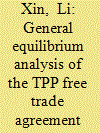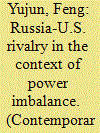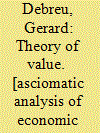| Srl | Item |
| 1 |
ID:
130916


|
|
|
|
|
| Publication |
2014.
|
| Summary/Abstract |
The approaching tenth year of the Doha Round with no achievements to celebrate indicates a failure of the World Trade Organization. Formal negotiations of the Round expired in 2005 without reaching a consensus, and informal negotiations were stalled in 2008. Thus, the Trans-Pacific Partnership (TPP), a recent initiative to deepen trade relations among countries bordering the Pacific, was greeted with applause and relief as a step in the right direction. This article discusses the region-wide Free Trade Agreement series of linked agreements that cover various members and issues. The recursive dynamic computable general equilibrium (CGE) model simulates two scenarios against the baseline, namely, a TPP agreement with China and without China. The preliminary results show that the TPP agreement without China cannot change the significant roles of markets and geography as the principal factors behind the economic integration of Southeast Asia with China. Trade and investment agreements facilitate market forces, they do not oppose them. The integration of the Asia-Pacific countries may benefit the US and other key economies.
|
|
|
|
|
|
|
|
|
|
|
|
|
|
|
|
| 2 |
ID:
132041


|
|
|
|
|
| Publication |
2014.
|
| Summary/Abstract |
Compared to Soviet-U.S. relations of the Cold War era, contemporary Russia-U.S. relations are less decisively in?uential in shaping the global strategic situation. While evolving, the new relationship between the two sometimes registers dramatic events-Syria and Ukraine, for example-that seem to endanger a proposed "reset" of their bilateral relations. This reset, first mentioned during the presidencies of Dmitry Medvedev in Russia and the first term of Barack Obama in the U.S., was not launched. Since the onset of the global ?nancial crisis, the international strategic situation has further readjusted, and big power relations have remained out of equilibrium. Progress toward improved relations witnessed "apathy" after Vladimir Putin returned to power. Both countries pay less attention to each other in their respective foreign agendas but they are wrestling fiercely in the ?elds of politics, security and geopolitics in spite of an accelerating imbalance of strategic power.
|
|
|
|
|
|
|
|
|
|
|
|
|
|
|
|
| 3 |
ID:
043827


|
|
|
|
|
| Publication |
New Haven, Yale University Press, 1959.
|
| Description |
xi, var.Pagination
|
| Series |
Cowles Foundation Monograph
|
| Standard Number |
0300015585
|
|
|
|
|
|
|
|
|
|
|
|
Copies: C:1/I:0,R:0,Q:0
Circulation
| Accession# | Call# | Current Location | Status | Policy | Location |
| 010310 | 339.5/DEB 010310 | Main | On Shelf | General | |
|
|
|
|